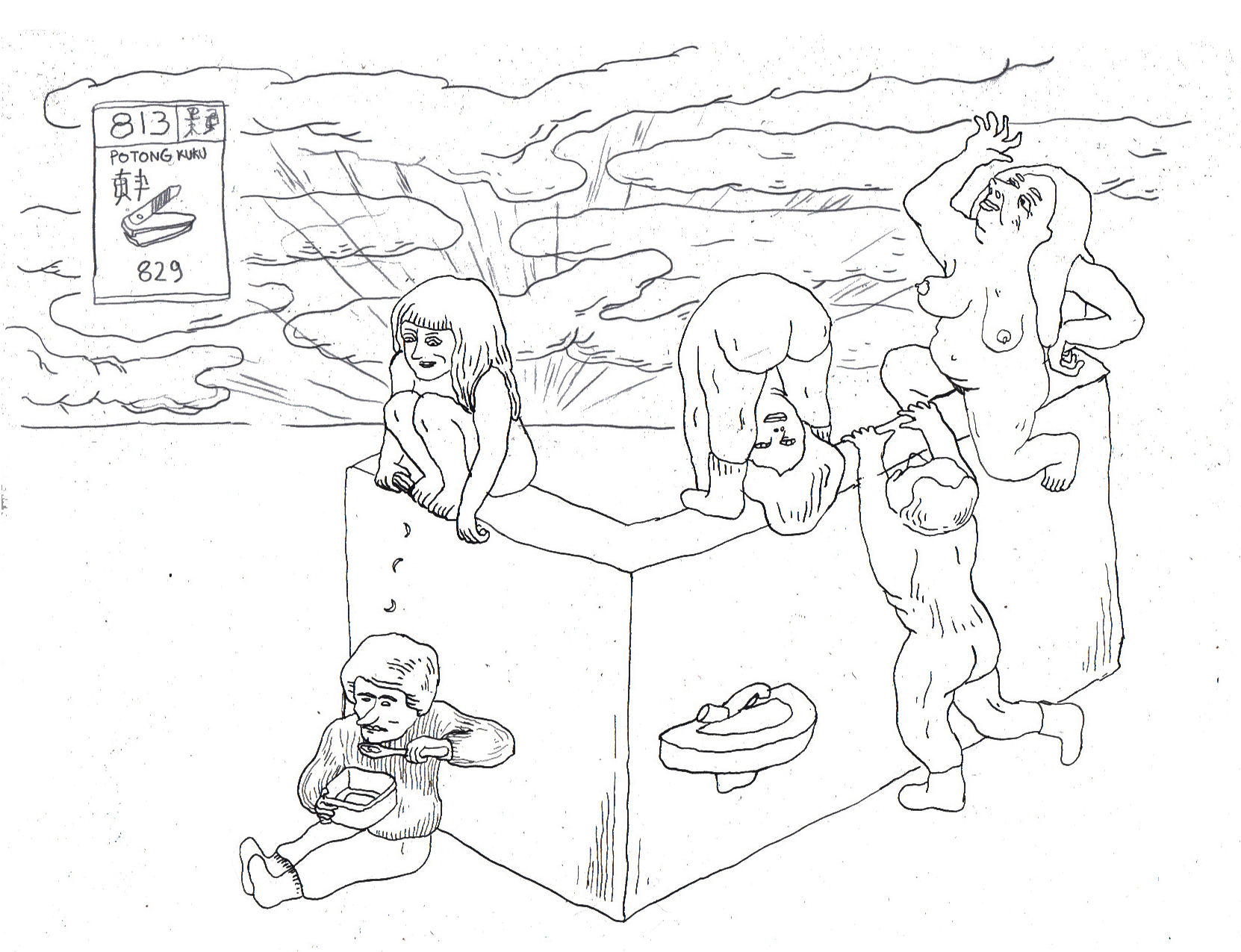Originally published in PLEASURE 2014

Illustration by Charlotte de Sédouy
Gabriel Pomerand
The D. Man
Two extracts translated by M. Kasper
Gabriel Pomerand was born in 1925 or 1926--accounts differ. He came to Paris in 1945 after having been a resistance fighter in Marseilles, and there met Isidore Isou, a young Romanian refugee, at a canteen in Saint-Germain-des-Prés. Together, they launched the Lettrist movement, an influential postwar avant-garde group that remained active through the 1960’s. Pomerand’s “metagraphic” Saint Ghetto des Prêts, the most sustained and accomplished bookwork of the Lettrists, came out in 1950; an English-language version was published by Ugly Duckling Presse in 2006. Beginning in the late 1940’s, Pomerand suffered from tuberculosis. He participated less and less in Lettrist activities, for that and other reasons. It was a fractious movement. He made a prize-winning short film, wrote a novel and a poetic account of a dance performance, published an anthology of philosophical excerpts, and, in 1966, released his last book, a short-prose sequence about his experiments with L.S.D., Le D. Man. In 1972, he committed suicide.
Discovered by a German, some Swiss, and an American, and disseminated widely in the United States where L.S.D. 25 begets sessions having a religious character subdivided into very private episodes, it’s natural that it returns to Europe equipped with a trans-Atlantic terminology, franco-yankee: acid parties, trips, reentry.
We owe numerous sports to the Anglo-Saxon nations, from soccer through golf, and we’ve borrowed their vocabularies as well. So let’s not be so chauvinist when it comes to ecstasy.
I wrote these notes and impressions in the midst of my experiments with D., and sometimes after having reflected at length. It seems to me that true knowledge of the drug must begin with information gathering. However, police control over this matter--I could say, this science--maintains a state of mystery and restriction that’s harmful to individual evolution, just as theological control, by prohibiting physiological experiments and anatomical usages, kept knowledge of the human body in a similar state of ignorance for ages.
This text therefore doesn’t claim to be more than one humble contribution to this knowledge. It’s a document that has given me sufficient pleasure in drafting that I’m indifferent to the welcome it will get on publication. For all that, I am nervous now and then about sharing my ignorant reflections on certain scientific notions, which have already been broached in published work, and even in the babbling that those doing hallucinogenic drugs are victims or guilty of.
When one digs a bit into the origins of the L.S.D. 25, one determines that its actual substance occupies a microscopic place on the square of blotting paper or in the sugar cube where it’s injected. Compared to how much devastation and spiritual uplift it can occasion, it’s not so much as one drop of alcohol solution in or on said sugar or blotting paper.
What I call a drug is a medication, a toxin, a narcotic, a form of nourishment that excites or distorts a personality. Literary types, in their own way, have devised finer categories. Inasmuch as I care, I reject them all since they’re organized only in terms of harmful or beneficial characteristics, and are ultimately nothing but constabulary distinctions.
Powerful poisons like potassium cyanide are more harmful than the nastiest narcotics and are nonetheless not considered drugs. As for me, I take pleasure even in poisoning myself.
I consulted several scientific works treating this topic and, despite a certain natural humility, didn’t wind up acquiring an inferiority complex. For quite some time now, I’ve stopped believing in the idea of academic experts, since the history of science teaches us that amateurs--and sometimes even specialists--often make discoveries by happenstance that are destined to upset the course of these same sciences. The expert intent on accumulating official credentials simply has no time to devote to studying unsocial indicators.
